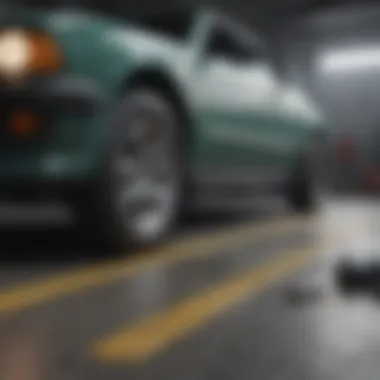Navigating Vehicle Inspections Without Insurance


Intro
Vehicle inspections are vital for road safety and compliance with local regulations. However, many vehicle owners face a significant hurdle when they do not possess active insurance coverage. This situation can create confusion and prompt inquiries about available options. Understanding how to navigate vehicle inspections without insurance is essential for vehicle owners. Not only does this knowledge empower them to make informed decisions, but it also ensures that their vehicles remain compliant with state laws.
In this guide, we will explore the intricacies of obtaining vehicle inspections without insurance, illuminating relevant regulations and alternative routes that can be taken. We aim to clarify the challenges presented and outline potential solutions for those seeking inspection services despite lacking current insurance coverage. This will include practical insights, focusing on various state-specific regulations, which can aid vehicle owners in their decision-making process.
Understanding Vehicle Inspections
Vehicle inspections play a crucial role in ensuring road safety and environmental protection. This section aims to clarify what vehicle inspections entail and why they are necessary. By understanding the complexities of this topic, vehicle owners can navigate the challenges associated with obtaining an inspection, especially when they do not have insurance coverage.
Definition and Importance
A vehicle inspection is a process whereby a certified technician evaluates a vehicle to ensure it meets specific safety and environmental standards. The importance of these inspections cannot be overstated. They help identify potential mechanical issues before they become serious problems. For owners, this can mean avoiding costly repairs down the line. Additionally, inspections contribute to public safety. Vehicles that are not functioning properly may pose a risk on the road, thus inspections are a way to mitigate such dangers.
Types of Inspections
Different types of inspections address various aspects of vehicle safety and compliance. Understanding these types can aid vehicle owners in preparing for what to expect.
Safety Inspections
Safety inspections are designed to assess various parts of a vehicle to ensure that it operates safely. This includes checking brakes, lights, tires, and steering. A key characteristic of safety inspections is their focus on preventing accidents. An inspection not only highlights current issues but can also educate owners about maintaining their vehicles better.
One unique feature of safety inspections is their ability to provide peace of mind to vehicle owners. Knowing that a vehicle has passed an inspection can reduce anxiety about road trips or daily commutes. However, a disadvantage may arise if a vehicle fails the inspection. This can create immediate pressure to make repairs, which might not be financially feasible for some owners.
Emissions Testing
Emissions testing involves measuring the pollutants that a vehicle emits into the environment. The main goal of this type of inspection is to ensure compliance with environmental laws and regulations. A major advantage of emissions testing is its role in promoting cleaner air. Vehicles that pass emissions tests are less likely to contribute to air pollution, aligning with public health interests.
However, emissions testing can also create a challenge for vehicle owners. Vehicles that do not meet emissions standards may require significant repairs, which can be costly. In regions with strict emissions laws, failing an emissions test may also limit a vehicle owner's options for driving or selling the vehicle.
In summary, understanding the different types of inspections provides vehicle owners with the knowledge they need to address their vehicles’ needs effectively. Safety and emissions inspections each serve distinct purposes that affect not only the vehicle owner but also the broader community.
Insurance Requirements for Inspections
Obtaining a vehicle inspection without insurance significantly impacts vehicle owners. Understanding the insurance requirements is crucial for compliance with state regulations. Generally, vehicle inspections are mandatory to ensure safety and emissions standards are met. However, insurance plays a defining role in the process.
State Regulations Overview
Different states have varied laws regarding vehicle inspections and insurance. Most states mandate that a vehicle must have valid insurance in order to qualify for an inspection. This is especially common in states with strict safety and emissions laws. The regulations serve to protect all road users, ensuring that only eligible vehicles are driven.
Some states may allow for inspections without proof of insurance, but conditions often apply. For example, a vehicle might require inspection for registration purposes. Thus, familiarity with your state’s specific laws is essential. Checking state government websites or referring to Wikipedia can provide insights into local regulations.
Common Misconceptions
Many individuals hold misconceptions about insurance and vehicle inspections. One prevalent belief is that inspections can be performed on uninsured vehicles without consequences. This is often incorrect. While it may be legally possible in some states, consequences may arise, such as fines or difficulties in renewing vehicle registration.


Moreover, there is an assumption that an inspection guarantees an automatic approval for insurance coverage. In reality, insurance companies evaluate various factors before approving a policy. Other factors include driving history, the vehicle's condition, and local laws.
It's important to clarify these misconceptions to avoid potential legal issues and ensure vehicle compliance. Understanding the insurance landscape can assist vehicle owners in navigating the complexities surrounding inspections.
Can You Get Your Car Inspected Without Insurance?
The question of whether you can obtain a vehicle inspection without insurance is critical for many vehicle owners. This is not simply a matter of logistics; it involves understanding the legal framework governing vehicle operations. In many jurisdictions, having a valid vehicle registration is more important than current insurance when it comes to scheduling an inspection. Knowledge of these nuances can aid vehicle owners in navigating their responsibilities more effectively.
Exploring Legal Possibilities
In general, most states require vehicles to undergo inspections regardless of insurance status. However, laws vary widely by location. It is crucial to grasp your state's specific regulations. Generally, you can legally take your vehicle to an inspection facility; the absence of insurance does not automatically prevent you from doing so. In several instances, inspectors may be more concerned about the vehicle's condition rather than your insurance documents.
That said, even if you obtain an inspection, you might face challenges when trying to register or legally operate your vehicle without insurance. State-specific laws may impose fines or legal consequences for driving uninsured despite passing the inspection.
Exceptions and Special Circumstances
While the law generally mandates vehicle inspections, specific situations can allow flexibility concerning insurance requirements. Two main scenarios deserve attention: vehicle registration and transfer of ownership.
Vehicle Registration
When exploring vehicle registration, owners often wonder if they can proceed without active insurance. Vehicle registration may sometimes occur with an inspection waiver, depending on your state’s legislation. A waiver allows vehicle owners to register their cars without prior insurance coverage, provided they meet certain criteria.
This system can serve as a popular choice for people who are currently unable to secure insurance but still need their vehicle registered. It's especially beneficial for those who encounter financial difficulties or who may not drive their vehicle frequently. However, it is essential to be aware that having a registration waiver does not exempt you from future insurance requirements.
Transfer of Ownership
In cases like Transfer of Ownership, the implications shift slightly. When purchasing a used vehicle, new owners may have a brief grace period during which they can get the car inspected without insurance. Most states allow new owners to drive the vehicle to an inspection facility within a limited timeframe post-purchase. The limited time can be advantageous for buyers who must meet inspection requirements pronto but may only have temporary insurance arrangements.
This approach facilitates a smoother transition of ownership, ensuring that buyers can move forward promptly without scrambling to secure insurance first. Yet, it is paramount to confirm specific conditions related to the transfer in your jurisdiction, as local laws govern this process.
Potential Challenges and Legal Issues
Navigating vehicle inspections without insurance presents several challenges and potential legal issues that vehicle owners must understand. The significance of this topic lies in the risks associated with failing to comply with regulations. Vehicle inspections serve as a safety net to ensure that the vehicles on the road meet minimum safety and environmental standards. When a car owner seeks an inspection without being insured, there are specific repercussions that can arise. Understanding these challenges is critical for anyone wishing to manage their vehicle inspection process responsibly.
Fines and Penalties
One of the foremost concerns when approaching vehicle inspections without insurance is the likelihood of facing fines and penalties. In many states, operating a vehicle without the required insurance is not only illegal but also can lead to significant fines. These can range from hundreds to thousands of dollars, depending on the jurisdiction and the circumstances. For instance, if a vehicle owner attempts to get their car inspected but is found to be uninsured, an inspector may report this to the authorities, leading to possible citations.
In addition to immediate fines, repeated offenses can increase penalty amounts. Frequent infractions may lead to higher insurance premiums or even challenges in obtaining future insurance coverage. Therefore, it is essential for vehicle owners to recognize the financial implications of neglecting insurance when seeking an inspection.
Future Insurance Implications
The absence of insurance during vehicle inspection can also create lasting implications for future insurance scenarios. Insurance providers assess risk based on a variety of factors, including a vehicle owner's history of compliance with state regulations. If a vehicle owner presents themselves as uninsured during an inspection, insurers may view this as a negative behavior.
Consequently, obtaining future insurance could become more complex. Insurers might impose stricter terms, higher premiums, or even decline coverage altogether. Thus, for vehicle owners, understanding this aspect is crucial. They must comprehend that vehicle inspections and insurance are interlinked elements of vehicle compliance and ownership.


"Insurance does not merely protect you; it reflects your commitment to responsible vehicle ownership."
Options for Car Owners Without Insurance
Navigating vehicle inspections can seem daunting for those without insurance coverage. However, it is essential to know that several pathways exist for car owners in this situation. Understanding these options not only highlights the flexibility within vehicle regulation systems but also offers practical alternatives that may lead to compliance with inspection requirements. This section focuses on exploring alternative providers and temporary insurance policies. Both routes present viable methods to underscore vehicle safety and ensure that compliance with state regulations remains achievable.
Exploring Alternative Providers
Alternative providers for vehicle inspections can serve as an important resource for car owners without insurance. These establishments may range from independent mechanics to specialized inspection shops. The key lies in finding those who do not mandate insurance as a condition for inspection services.
- Independent Mechanics: Many independent garages offer inspection services without requiring proof of insurance. This option could save both time and money. Contacting local mechanics directly to inquire about their policies can lead to discovering hidden gems in your area.
- Mobile Inspection Services: Some mobile service providers will come to your location for vehicle inspections. This can be convenient for owners who cannot drive their uninsured vehicle. Typically, these services might be more flexible and less stringent about insurance requirements.
- State-Sponsored Programs: In some states, government-sponsored inspection programs or community initiatives aid vehicle owners with lower-income status or those working with specific hardships. Checking local government resources could reveal opportunities to participate in such programs.
- Local Dealerships: Certain dealerships may provide inspections as part of their customer service. In some cases, they may not require insurance until you take the vehicle off their premises.
Exploring these alternatives carefully ensures that vehicle owners can still fulfill inspection requirements while managing financial constraints.
Temporary Insurance Policies
Opting for a temporary insurance policy can be an effective solution for vehicle owners seeking vehicle inspections. Such policies, often referred to as short-term car insurance, allow individuals to obtain a minimal level of coverage just for the duration needed to pass an inspection.
- Coverage Flexibility: Temporary insurance typically provides flexibility in duration, ranging from a few hours to a few weeks. This can cover the period during which the vehicle will be inspected or driven for testing.
- Cost-Effectiveness: For many, the cost of temporary insurance can be significantly less than committing to a full policy, especially if the vehicle will not be driven frequently. This approach can alleviate some of the financial burdens that come with traditional insurance costs.
- Quick Activation: Many providers offer easy application processes that allow vehicle owners to activate coverage quickly. This is especially useful for those needing immediate inspections.
Ultimately, the decision to acquire temporary insurance requires careful consideration of costs and coverage. However, for car owners without existing insurance, this route can serve as a bridge, providing the necessary protection to complete required inspections.
"Exploring alternatives and temporary solutions enables a proactive approach towards vehicle compliance."
In summary, both exploring alternative providers and acquiring temporary insurance are practical options for car owners without insurance. Each option presents unique benefits that ensure compliance with inspection requirements while easing the financial strain often associated with vehicle ownership.
State-Specific Case Studies
Understanding how vehicle inspections function within different states is critical for vehicle owners without insurance. The regulations and requirements can vary significantly, reflecting the local governance and policy aims. By diving into state-specific practices, vehicle owners can equip themselves with knowledge that dictates how they should proceed. This section aims to clarify the distinctions, advantages, and unique considerations found in relatable case studies from various states.
State A Regulations
In State A, vehicle inspections are mandated annually. The law requires every vehicle on the road to pass a safety inspection before registration. However, it is noteworthy that during this procedure, there may be leniency if the vehicle is a classic model or under special restoration. Thus, vehicle owners can obtain the required inspection even when facing issues with their insurance. Nevertheless, some inspection stations may insist on proof of insurance as a standard policy, regardless of overall state guidelines.
The implication for vehicle owners is significant. They need to understand that if they lack insurance, they might face challenges in finding an inspection facility. Potential penalties for failing to comply may also arise, including fines that can accumulate. It’s prudent to explore local laws, as regional variations can affect the literal application of vehicle inspection rules.
State B Regulations
Compared to State A, State B has established a more flexible approach. Inspections are conducted twice a year, but vehicle owners have the option to complete emissions tests separately in some counties. Interestingly, the regulations in State B explicitly mention that an inspection can be obtained without active insurance coverage. However, it's essential to clarify that while insurance is not a requirement for the test, having valid registration is.
In practice, this means that if a vehicle owner needs an inspection done, they can proceed without the barrier of insurance. However, to avoid any further legal complications, they should ensure their vehicle registration is current. Knowing these subtleties can facilitate timely inspections without unnecessary impediments.
State Regulations
State C emphasizes stringent inspection requirements, particularly surrounding emissions control. The law seeks comprehensive compliance, but there are provisions for those without insurance. In this state, vehicle owners can apply for a temporary inspection license, which allows for inspection in absence of regular insurance. This temporary status comes with its own rules and needs to be documented properly.


Owners must carry documentation that explains the temporary basis of their inspection. While this option exists, it often comes with additional costs. Since the overall scheme focuses heavily on environmental factors, this becomes an essential point of consideration. Knowing that State C has these unique allowances helps vehicle owners navigate their options intelligently.
"State-specific regulations often dictate the fluidity of conducting vehicle inspections without active insurance. Awareness of local laws is fundamental."
In summary, case studies highlight that individual states tailor their vehicle inspection laws in varied ways, providing options and restrictions that reflect local priorities. For vehicle owners without insurance, comprehending these regulations can mean the difference between compliance and facing mounting fines.
Practical Steps for Vehicle Owners
Navigating vehicle inspections without insurance can be daunting. This section outlines the practical steps vehicle owners can take to prepare effectively. Understanding these steps can facilitate a smoother experience and minimize complications.
Preparing for an Inspection
Preparation is key to a successful vehicle inspection. First, vehicle owners should understand what to expect. Familiarize yourself with the inspection standards in your state. This can include safety checks and emissions testing, depending on local regulations.
Before heading to the inspection, ensure your vehicle is in good condition. Conduct basic checks on lights, brakes, and tires to avoid common pitfalls. An overview of necessary checks includes:
- Lights: Ensure all headlights, taillights, and indicators are operational.
- Brakes: Check for responsiveness and noise.
- Tires: Verify tread depth and pressure.
- Fluid Levels: Ensure oil, coolant, and brake fluid are at appropriate levels.
By addressing these elements, vehicle owners can potentially reduce the time spent at the inspection facility and enhance the likelihood of passing on the first attempt.
Interaction with Inspection Facilities
The interaction with inspection facilities is a crucial aspect that vehicle owners must navigate carefully. First and foremost, it is beneficial to choose a reputable facility. Research online reviews or ask for recommendations from other vehicle owners.
When visiting the facility, be prepared to provide necessary documents, such as identification and vehicle registration. If you do not have insurance, clarify this upfront but remain calm.
In addition, it might be helpful to inquire about the specific inspection process. Ask questions about time needed, potential fees, or requirements that may vary from state to state. Clear communication can ease the process and build a cooperative relationship with the staff.
Here are some tips for the interaction:
- Approach with a polite demeanor.
- Have all necessary documents ready to present.
- Inquire about the inspection steps and services offered.
Establishing a positive rapport with inspection facility staff can lead to a more favorable inspection experience.
Ending: Making Informed Decisions
Navigating the terrain of vehicle inspections without insurance presents a myriad of complexities that require careful consideration. As we have explored throughout this guide, understanding the legal landscape and practical options can enable vehicle owners to make informed decisions.
One significant element to consider is the regulatory variations across different states. Each state imposes its own rules and requirements regarding vehicle inspections and insurance. Therefore, being informed about these intricacies is crucial. Vehicle owners should take the initiative to research their local laws thoroughly. This will not only aid in compliance but also help to avoid unnecessary fines or penalties due to ignorance of regulations.
In addition, recognizing the implications of going without insurance during the inspection process is vital. Owners may find themselves vulnerable to legal repercussions or future insurance issues if they choose the path of least resistance. These potential consequences highlight the necessity of a proactive approach to vehicle inspections and insurance coverage.
Utilizing alternative routes such as temporary insurance policies or inspection services that do not require proof of insurance can be beneficial. Identifying these options opens avenues for vehicle owners to meet regulatory obligations without jeopardizing their standing.
Additionally, the article emphasizes the importance of preparation before obtaining an inspection. This involves understanding the types of inspections that may be needed and ensuring that all vehicle documents are in order. Such organization can streamline the inspection process.
In summary, making informed decisions about vehicle inspections in the absence of insurance necessitates thorough research, awareness of local regulations, and preparation. By considering these factors, vehicle owners can navigate the complexities effectively, ensuring compliance while mitigating any potential risks associated with vehicle inspections.
Informed decisions lead to responsible ownership. Understanding regulations and options empowers vehicle owners.
Ultimately, the goal for vehicle owners should focus on merging legality with practicality. Engaging with reliable inspection facilities and understanding state-specific regulations can provide peace of mind and assurance as one moves forward in the vehicle ownership journey.



